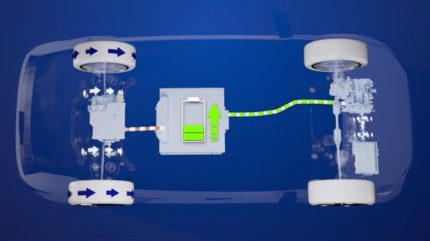
ZF, a provider of driveline and chassis technology, says it is advancing the range extender technology for electric vehicles, with production set to commence in 2026.
The company, which produced range extender technology notably for fleet of London taxis, is currently developing the next wave of this technology, focusing on two advanced models.

Discover B2B Marketing That Performs
Combine business intelligence and editorial excellence to reach engaged professionals across 36 leading media platforms.
These two new electric range extenders are the electric Range Extender (eRE) and the electric Range Extender plus (eRE+).
The electric range extender systems aim to alleviate the prevalent ‘range anxiety’ among potential EV buyers by providing a combustion generator that pairs with an electric motor to recharge the vehicle’s battery.
ZF Electrified Powertrain Technology R&D senior vice president Dr Otmar Scharrer said: “Although the all-electric range of passenger cars is around 500km on average, range anxiety still influences a wide range of buyers when choosing their next vehicle.”
This concern is particularly acute in areas with underdeveloped charging infrastructures.
ZF said the new next-generation range extenders are being developed to address these challenges.
“These represent a real alternative to larger – and thus more expensive – batteries or plug-in hybrids,” Scharrer added.
The eRE and eRE+ variants aim to offer high integration and flexibility in terms of performance, electrical/electronic architecture, voltage (400V or 800V), and semiconductor type.
The eRE links an electric motor with an integrated inverter, software, and planetary gearset, while the eRE+ also features an intelligent clutch and differential. Consequently, it can function either as a current generator or as an extra secondary drive, offering manufacturers the advantage of not having to develop a distinct component for these purposes.
Performance can also be scaled from 70 to 110kW for the eRE and 70 to 150kW for the eRE+.
Scharrer added: “The new interest and the increased demand for range extenders shows that the potential of this technology is far from exhausted – in particular for model platforms that are already designed for battery-electric drivelines.
“Behind our solutions is the system and platform concept. This means that we are optimally equipped to be able to respond to all customer and market requirements with shorter development cycles.”
Range extenders combine a combustion engine with an electric generator that recharges the vehicle’s battery whenever its charge falls below a specified level.
The benefit over plug-in hybrid electric vehicles (PHEVs) or traditional combustion engines is that the range extender operates consistently within the optimal performance range for fuel efficiency. This results in reduced fuel consumption and, consequently, lower CO2 emissions, stated the company.
Earlier this month, ZF’s Commercial Vehicle Solutions (CVS) division received a contract from an undisclosed commercial vehicle manufacturer in India to supply AxTrax 2 electric axle systems.






